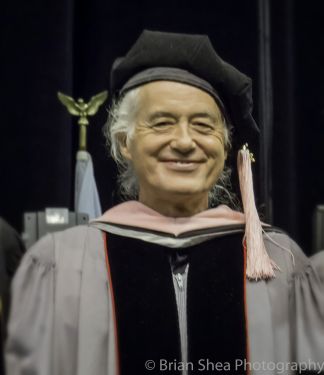Interviews
- Details
- Written by: Giovanni "Gio" Pilato
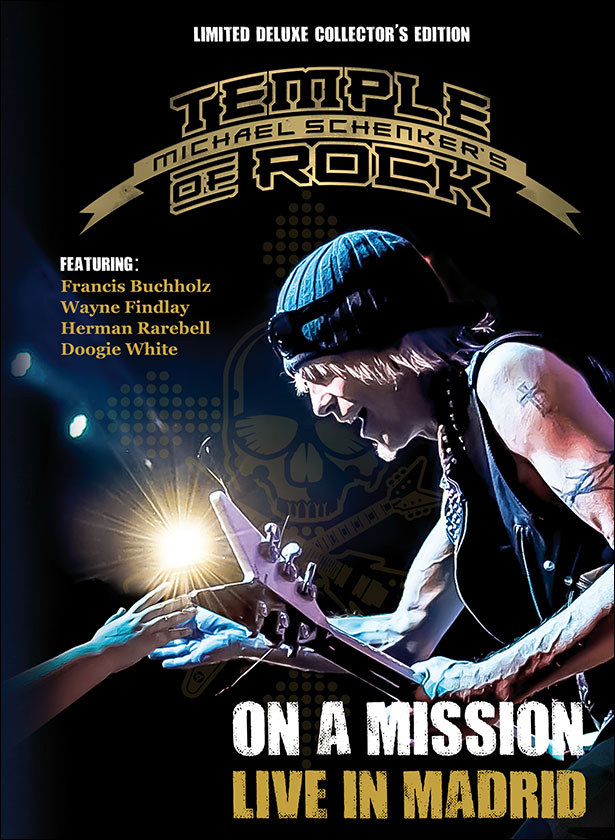
(Photo by Laurence Harvey)
When it comes to the definition of Guitar Heroes, few names crop up in Bluebird Review's head and Michael Schenker is definitely one of those. Throughout his long and glorious career, Schenker has been at the forefront, through his unique style and guitar technique, of the success of bands such as Scorpions, UFO, Michael Schenker Group and, currently, with his latest project, Temple Of Rock.
Just before the starting of the Temple Of Rock Tour of the United Kingdom, we had the pleasure, at Bluebird Reviews, to meet Schenker and talk about live touring, his latest record Spirit On A Mission and his fabulous career.
BBR - The 2015 record Spirit On A Mission is the natural step on to that splendid album that is Bridge The Gap. Does your latest studio album, in your opinion, capture in full the vision you have of the sound of Temple Of Rock as a music project or will there be further musical developments on your next album?
MS - Spirit On A Mission is certainly a step on in that respect but I like to think that the album is just a natural progression of where we were with Bridge The Gap. The next album, which we hope to release in 2017, will move again the sound of the band to a new level and from that point on, I believe that we will be able to get what we want to achieve, a truly unique sound. Once we will get to the third or even fourth album, the shape of our music will reach what we want to achieve, in creating a distinctive sound for Temple Of Rock. Once we have finished our Tour in February this year, we will also be looking for a new record deal. So, there will be few things happening this year but our fans will get adequately entertained due to the release of our live DVD. Hopefully they will not miss us too much (chuckles).
BBR - What impresses me the most on Spirit On A Mission, besides the fabulous quality of the musicians within the band, is the growing chemistry between you, Wayne Findlay's artistry on the 7-strings' guitar, Doogie White's vocals and the roaring sound of your guitar. With such platform, to record the new album should not take too long, what do you think?
MS - I wouldn't be able to give you a precise timeline, right now. The way I tend to put an album together, is by doing what I like to call "treasure hunting" or "play and discover". Those words mean that I play my guitar and I come up with new melodies or riffs, I then collect them all together and use them as sketches or basis on which to build our new songs. At the moment, there is so much going on with us, between having our new album to promote and been out On The Road touring since February 2015 that I struggle even to remember when Spirit On A Mission was precisely released! Last album took about eight months in preparation, the next album may take longer or maybe not. Time will tell.
BBR - You will be starting the english portion of your European Tour in support of the Spirit On A Mission album on January 20th. How thrilled are you and the band to come back and perform in a country like England that loves and supports you enormously?
MS - Very thrilled. Touring the United Kingdom means a lot to me, on many levels. England was the country where I "escaped", at the time I was with the Scorpions. I remember, at the time, I think I was 17-18, I told the guys in the band "If ever any English band would ask me to join them, I would leave the band straight away anytime, I wouldn't care how famous our band would be". I always had an attraction for the Uk, because, to me, that was the place in the world where people would understand my music style. To go to England was like a dream come true for me. I remember coming there for the first time with the UFO in places like Sunderland, Newcastle, Glasgow etc. Wonderful times. We saw our fan base, back in those days, growing and growing, year after year and I feel like my contribution to music history started right there at that time. With this in mind, you can imagine how excited I am to come back and tour in England again. For me is like home. I have been living for so many years in the States and in England that Germany has become the least of my living places through all these years.
BBR - Bluebird Reviews is aware that a Temple Of Rock Live DVD, which you mentioned before and recorded in Spain last year, is due to be released sometimes in 2016. Which are your immediate memories of that live recording and is there already a pre-planned release date for the DVD?
MS - The DVD will be released in April 2016. When we made the decision to record the DVD in Madrid, we had to focus on the stage size. The whole camera crew was almost squashed on the wall, when they were filming. Despite being a big three-storeys venue, size wise it was a challenging experience for the cameramen but they did really well. We were so close to the crowd that I barely remember, in my career, to have done so many high-fives in one night in a show as I did in Madrid! But we really wanted to capture the immediacy of the moment and the warmth coming from our devoted Spanish fans and I am happy about the way the DVD succeeded in showing so. Spain is always a special place for us, I love the way the Spanish people celebrate their joy through our music. They have got this inner happiness inside and they are truly fantastic. We would have loved to film a live DVD also in England but, due to budgetarian issues, we decided to postpone it. But a live recording in England is definitely on the agenda, in future!
BBR - Michael, you have been playing live since you were 11 years old. Which were your biggest musical influences at the time?
MS - Truth to be told, I started to have the real hang of it when I reached 14 years of age. I started to play at the age of 9 and my first gig was age 11, but on stage, I was just playing very plain kind of guitar music, purely charts stuff. When I started to dig deep into the late 60's music style of guitar players such as Jimmy Page, Eric Clapton, Jeff Beck, Rory Gallagher and so on, that was the moment in which I understood what direction my music style was going to take. Then, when I joined forces with Klaus Meine from the Scorpions, I wrote my first song, In Search Of The Peace Of Mind, which ended up on the first Scorpion's album, Lonesome Crow. The song was attributed to all the member of the band, on the album but, in reality, I wrote it. That was very naive of me, at the time. They were a little but older than me at the time, so perhaps a bit more clever than I was at that age in convincing me to share the rights. I was so focused on playing my guitar that all I wanted was to play my music. I guess I was just misguided by my inexperience, back then.

(Photo by Steve Brinkman)
BBR - What is the biggest lesson that you have learned, throughout your long and glorious career as a musician?
MS - I don't really think I had any lessons at all! (chuckles). I like to teach myself, not to take lessons. The best part of life, to me, consists in learning and discovering yourself entirely on your own. For instance, I wanted to go skiing but I did not want to use a Ski Instructor because I wanted to learn how to ski by myself, on my own pace, step by step. This aspect, about discovering yourself, also applies to my approach in playing guitar. It's like when you sit down, improvising and put two notes together and then you say to yourself "Wait a minute!". Then you put a third note to them and you go "Wow!" and so on. It's this thrilling, daily learning curve about things you find out by yourself that really excites me. Life for me is, essentially, to be able to do any sort of things on my own steam, knowing you have to do them because it is the only way to learn and understand them. And by doing so, as a result, you will be able to figure out what works best for you and adopt this philosophy of life in all that you do on a daily basis. Perhaps, without this attitude about pushing myself so much, I would have never be able to reach the position I hold in the music business today.
BBR - You are going to be part of a very special rock cruise, in February! Taking off from Miami, the Axes & Anchors line-up will include an outstanding cast of rock artists, which obviously includes you and people like Yngwie Malmsteen and Zakk Wylde, amongst many others. Have you prepared a special setlist for this very unique event?
MS - We were planning to go on this Rock Cruise but, at the moment, it's all in a limbo stage, due to the fact that David Van Landing, which was supposed to be our singer on this special occasion, passed tragically away in a car crash, last year. Due to this very sad circumstances, we are trying to work out now how we are going to deal with this special event. As it stands, we have not reached yet a decision whether to confirm our presence or not. We hope to give more precise news on the subject in the next weeks.
BBR - Are there any of your songs, coming from the songbook of your experiences with Scorpions, UFO, The Michael Schenker Group and Temple Of Rock that ultimately defines you as Michael Schenker, The Rock Meister?
MS - There are many songs I can think of. Live And Let Live is certainly one of those. It is one of those special tracks that, while on stage, gives me the chance to go off the wall with my guitar and let it loose. Sometimes, if I manage to come up with something magic when I let loose, it may work in my favour or sometimes it may not. But, hey, what a great feeling to hear the roar of the crowd, when that magic happens. Overall, I would say that any songs that allow me to get a lot of space to play guitar solos in the middle sections and show to the fans why I chose to play the guitar in my career get the thumb up from me. I remember fondly a song called Lonesome Crown, at the time I was with the Scorpions, which gave me plenty of opportunities to do guitar solos. And I love to do so not just on fast-tempo rock songs but also on more melodic ones or ballads, even, like Lipstick Traces, Try Me or Lights Out, for example. I can't help it, I just love to play guitar! As an artist, I see my whole music career as a constant development of my skills, always. I can still remember the incredible feeling of recording the first album with the Scorpions and hearing our songs played on the radio. The same radio that was playing songs from the Zeppelin or Jimi Hendrix. Or the happiness in recording albums with an English band in England, which I thought of, at the time, as my Promised Land of music. I like to think that, every new album I record, it demonstrates how I move on, how I develop, artistically. From the Scorpions era, to UFO, then another new music ground for me with the Michael Schenker Group and now Temple Of Rock. To experiment new musical territories, to challenge myself, that is the real buzz for me. Every new album I release will be always different from the last one, because I have taken all the new skills learned to a new level, becoming, as a consequence, a different musician. One thing I can tell you for sure is that I like this new stage of my music life and I promise I shall play my songs until I have an ounce of strength into my body. Starting from next week in England.
Giovanni "Gio" Pilato
2016 Temple Of Rock UK Tour Dates:
BILSTON, ROBIN WEDNESDAY 20th JANUARY 2016 Box Office: 01902 401211 Book Online: www.thegigcartel.com 20-28 Mt Pleasant, Bilston, West Midlands, WV14 7LJ www.therobin.co.uk
HOLMFIRTH, PICTUREDROME THURSDAY 21st JANUARY 2016 Box Office: 0844 478 0898 Book Online: www.thegigcartel.com Market Walk, Holmfirth. HD9 7DA www.picturedrome.net
EDINBURGH, QUEEN’S HALL FRIDAY 22nd JANUARY 2016 Box Office: 0131 668 2019 Book Online: www.thegigcartel.com 85-89 Clerk Street, Edinburgh EH8 9JG www.thequeenshall.net
INVERNESS, IRON WORKS SATURDAY 23rd JANUARY 2016 Box Office: 0871 7894173 Book Online: www.thegigcartel.com 122B Academy Street, Inverness, Inverness-Shire IV1 1LX www.ironworksvenue.com
GATESHEAD, SAGE MONDAY 25th JANUARY 2016 Box Office: 0191 443 4661 Book Online: www.thegigcartel.com Saint Mary's Square, Gateshead Quays, Gateshead NE8 2JR www.sagegateshead.com
LIVEPOOL, ACADEMY TUESDAY 26th JANUARY 2016 Box Office: 0844 477 2000 Book Online: www.thegigcartel.com O2 Academy Liverpool, 11-13 Hotham Street, L3 5UF www.o2academyliverpool.co.uk
MANCHESTER, ACADEMY 2 THURSDAY 28th JANUARY 2016 Box Office: 0161 275 2930 Book Online: www.thegigcartel.com Oxford Rd, Manchester, M13 9PR www.manchester-academy.org
NOTTINGHAM, ROCK CITY FRIDAY 29th JANUARY 2016 Box Office: 0845 413 4444 Book Online: www.thegigcartel.com 8 Talbot Street, Nottingham NG1 5GG www.rock-city.co.uk
ISLINGTON, ASSEMBLY HALL SATURDAY 30th JANUARY 2016 Box Office: 0844 478 0898 Book Online: www.thegigcartel.com Upper Street, London N1 2UD www.islington.gov.uk/assemblyhall
- Details
- Written by: Giovanni "Gio" Pilato
 (Photo by Jani Mahkonan)
(Photo by Jani Mahkonan)
You don't need the sun shining, outside, in order to feel happy when you are in the company of Erja Lyytinen. Her sole presence, her smile, beauty and charisma is enough to light up an entire country. Add to those qualities an insane ability in playing guitar and then you get the whole picture about Erja Lyytinen. From her hometown Kuopio, in Finland, this extraordinary artist has gone very far in the last 10 years. With both parents coming from a musical background, it was kind of natural that Lyytinen would follow the family trade since a very young age. "When I was a child, being my parents musicians, I used to fantasize that a couple, before getting married, should play at least a concert together. Typical fantasies of a 5-years old girl!".
The Finnish Guitarist/Singer/Songwriter is in a great moment of her career. Lyytinen has released, early this year, an excellent live album recorded at the prestigious 100 Club in London, UK, rated by the music press as one of the best live blues albums of the year. "I do remember that when I went there, I expected the place to be exactly like it was back in the days. Looking at all those photo frames on the wall, showing that the cream of the music industry had been performing there was really impressive. I also remember the whole recording evening going really fast. I had to do some photo shoots with my favourite photographer Tina Korhonen that night, prior to the gig and I was rushing to get ready, put some make up on and go to Soho for some photos, then back at the venue for some extra photos. It was crazy! Then there was the soundcheck, the camera crew trying to get the best position for the DVD recording, so much going on. But it was all worth it. It was a lot of fun to record that night of music, good time and great crowd. And I do remember also that our opening act, that night, was an all-male band all dressed up like women. That has been an experience to witness too! (chuckles)"
Lyytinen is an authenthic joy to talk to. Energetic, with a witty sense of humour and with a contagious positivity. BBR asks to the Finnish artist whether growing up in a musical household and her parents being both musician, has pressured Lyytinen in any stage of her life. "You are the first person ever to ask me this question. I have been privileged never to be pressured by my parents, when I announced I wanted to become a musician. Quite the opposite, they encouraged me and provided all the support possible that I needed every time. They never pushed me to do anything. As a teenager I liked a lot music and I liked a lot sports too. In the end, music took over because I always dreamt, since a very young age, that I wanted to travel Europe and play my music. I am really truly thankful to my parents for never putting any pressure on me at all. I have got such fabulous memories of me, at 14-15 years of age, in my living room, playing my guitar with my mother, which was hugely supportive but perhaps a little more critical in judging the quality of my music in comparison to my father, looking at me and saying: "Erja, you know what? That stuff you just played sounds really good!". That was real validation for me. I thought "Wow, if my mother gives me the seal of approval, I must be really doing good music".
One of Lyytinen's trademarks, as a performer and a blues guitarist, has always been improvisation, which comes even more evident during live performances. "If you are familiar with my works, you will certainly know that I like to change the shape of songs from their original format, therefore, yes, improvisation is really important for me. Just to give you an example, on one of my songs, Soul Of A Man, I put a lot of different chords while singing on one key. If I had my guitar with me, I'd love to play it to you right now! By adding extra chords to basic ones, the melody of the tune somehow elevates and I like to do that kind of thing in my songs. I grew up playing my guitar in the way we were tought at school, that means using a lot of improvisation. I remember I'd always be practicing a lot over changing rhytms as well. Different type of music scales like jazz, blues, you name it. I just wanted to challenge myself in different styles and become as good as I could possibly be in playing guitar on any genre. Blues is a real passion for me and to be able to improvise, in my opinion, is a must for every blues musician".
 (Photo by Adam Kennedy)
(Photo by Adam Kennedy)
The Finnish artist spends, as many fellow blues artists, the best part of each year performing live with her extra added "On-The-Road" music family. Playing with trusted musicians must be absolutely vital for every artist and to have the right chemistry with them, night after night is a key factor. Lyytinen seems to fully agree to BBR's thoughts on the subject. "Chemistry between musicians is fundamental, especially performing live. When there are tensions between musicians, it is very palpable on stage, both for us musicians and for the crowd too. That is the reason why I think that it is vital to support one another on stage, to have the right atmosphere and respect each other. In that way, the core of what we play on stage will be fully respected and the performance will gain a lot from the positive vibes within the band too. As musicians, as long as you respect what you are doing when you are on stage and you respect the audience, all will be just fine. Another key word for me is enthusiasm. You need to be excited in what you are doing, when you are up there. In my career, I have come across many different musicians and, to me, it doesn't matter what gender you are, how old you are or how professional you can be. As long as you express joy and vitality when you perform, that will do for me and we will get along just fine".
Strangely, given Lyytinen's great ability and skills as a guitarist, the first instrument she learned to play was the violin. "Initially, I was asked by my parents if I wanted to try and play the piano, then came the idea to introduce me to violin, because my cousin was playing violin and they thought it might have been a nice instrument for me to learn to play. To play violin inspired me in many ways. I started, initially and strangely, to play classical music on violin despite the fact I was listening, back then, many different types of music but classical. The moment I picked up the violin the very first time, I clearly remember how excited I was. I found it inspiring and I played it until I was 14-years old. I have got fond memories of my last year playing violin because I got to play Russian Violin with two teachers, one of which was really young and handsome and I think I might have had a little crush on him! (chuckles). Studying classical music via the violin was great fun indeed. I remember also that once, when I was 10, I played on stage with an entire orchestra and I shall never forget the beautiful harmonies and the fabulous shivers down the spine that experience gave me. But then, as you can imagine, being young and willing to play rock music, rather than playing classic instruments, I decided to move on because I wanted to rock the world! (chuckles). So from a magical world of classical music, I have moved to the world of mystical blues vibes, which I totally love".
Lyytinen started to make records from 2002, in a music era in which there were not many female blues guitarists worldwide, certainly not of the same calibre of the Finnish artist. That certainly makes Erja Lyytinen a pioneer for female blues guitarists in her own right. "I am very proud you are saying that about me! (chuckles). I guess I am a little bit a pioneer within my generation of female blues guitarists. When I started playing guitar at the age of 15, as far as I remember and bearing in mind that, back then, there was no internet yet and I couldn't do any research on the subject, there were not many women in Europe playing blues guitars. Somehow, as the years went by and perhaps with the help of the internet, there has been an increasing interest from women in studying , appreciating and learning the blues, which I think it's fantastic. I never thought, when I was a child, that I would so passionately embrace the blues but hey, here I am! As a teenager, I started listening to artists such as Bonnie Raitt, Rory Block and Deborah Coleman which made a real impact on my blues formation. And then, when I signed for Ruf Records (Erja's label), about 10 years ago, I remember I got to play with brilliant guitar artists such as Ana Popovic or Sue Foley. What great fun that has been. From that point on, in the following 5 years, the world of female blues guitarists has grown so incredibly much and there are now so many talented ladies out there playing guitar really well. Very soon, in few years time, I feel there will be no need to define a specific gender when talking about the subject of "blues guitarists", because we ladies are simply as good as the boys!".
Bluebird Reviews has been following Lyytinen's live activity costantly over the last few years. Every crowd always look mesmerised not just by the class and quality of this incredible guitarist and by her performances but also by her intense singing style and her appearance. Given how stunningly beautiful Lyytinen is, there is no wonder why she gets the attention of the spectators also from a non-musical point of view. One cannot stop to wonder what Lyytinen checks first, before going on stage every night, whether it is the hairdo, the guitar pedals or the outfit. "Are we counting the soundcheck too? Because that would change the whole sequence you just mentioned! (chuckles). I have got to admit, I check the pedal board first. If I have an opening band performing before me on the night, then perhaps I would check my hairdo first, then the guitar pedals. Not that long ago, I had the privilege of playing with a 25-elements orchestra in Finland, called Rikiu Niemi. Full band, a string section, the horn section, you name it. I remember the second night I played with them, there was this young girl, part of the orchestra, who didn't make it the first night of the performance and, as a consequence, never met me before. After the show, that second night, she approached me and said "I saw you, an ordinary girl, coming on stage before the show and checking your pedals. That was not the same girl that came on stage when the show started later! You came on stage wearing a black leather mini-skirt, eye-lashes, your hair done beautifully, just like a sex bomb! What the hell happened to you before the show and when you came on stage?". And I couldn't stop myself laughing. I explained to her that it was just a part of me. I am a woman, therefore I like dressin' up and I would love to spend a fortune on clothes but it wouldn't be wise, especially now that I have kids. I would spend a lot of money on guitars too but that wouldn't make me a very good and wise mother! (chuckles).
 (Photo by Tina Koronen)
(Photo by Tina Koronen)
Since Forbidden Fruit, her 2013 last studio album, Lyytinen has not released a new album with new original material. Bluebird Review heard that 2016 may see a new studio album being released by the Finnish Guitar Virtuosa. "What you heard is true. We are currently working on the album, which is already at a very good stage and will be released next year. My last studio record, as you said, was almost 3 years ago and I cannot wait to unleash this bunch of new songs I have written. Some of the new material has been tested on my recent UK Tour and I felt the feedback coming from the crowd was excellent. There are a lot of personal subjects involved in the songwriting of my new material. On the new album, I shall dig deeper into the blues but also trying, in the meantime, to explore a little bit new musical territories. I want also for the album to be recorded with that live and studio elements combined at the same time. In essence, I want to be able to capture the rawness and immediacy of a live recording and refining it with studio technology. I am very excited about this next album, I cannot wait to release it".
For somebody so highly respected and talented, to be a mother, a successful musician and have a Master's Degree in Music must be feeling already very gratifying. Bluebird Review is wondering whether there is any other dream that Erja Lyytinen would like to fulfil along her life journey. "Good question. I have always had an adventurous mind and I lived in many places, such as Denmark, Sweden and United States. I would love to try and live somewhere else away from Finland, just for a little while, as a life experience. But there is a lot to take into consideration, including the fact that I should move with my children, which are very young right now but, hey, one day it may happen, never say never".
Before we part company, given the fascinating musical journey Lyytinen has been on so far and her great passion for music, it is necessary to ask where this incredible and talented musician sees herself, musically speaking, in 10 years from now. "Difficult to say. At this stage of my life and career, I wouldn't be able to predict it. In my next album, together with playing blues, as I said before, there will be some new music elements in my songs. Little touches of rock at times, with tempos that may remind you occasionally of different artists, from Pink Floyd to Jeff Beck. And in-between all this, there will be me, storytelling about myself and my life in my lyrics. I guess that the different variety of music I put on my records defines who I am in that precise moment, both as an artist and a person. Certainly, when I did the Elmore James tribute album a little while ago, that helped me to dig even further into blues and I am pretty positive that blues will be always there, walking by my side. Ask me the question again in 10 years time, that is a Press Date between you and I!".
Giovanni "Gio" Pilato
- Details
- Written by: Giovanni "Gio" Pilato
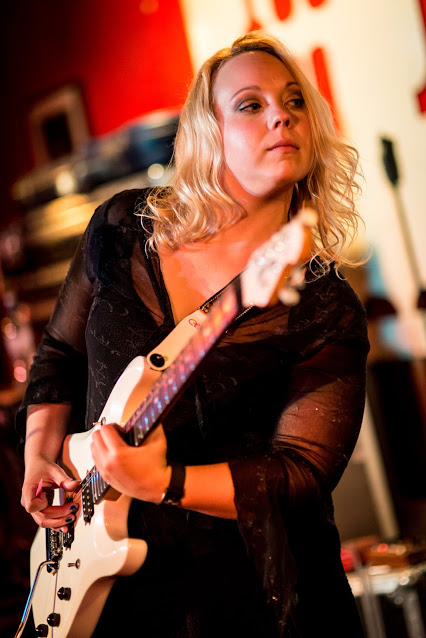
(Photo by Laurence Harvey)
She rocks arenas worldwide through her phenomenal ability on guitar and with her beautiful voice. 2015 has been a very special year for Chantel McGregor. The new album, Lose Control, is a record that McGregor likes to define "Southern Gothic Rock" and marks a new high in the career of the young and very talented singer/songwriter.
Bluebird Reviews has managed to catch up with Chantel McGregor, now that she has just returned from her European Tour and discuss the new album, her career and life in general.
BBR - Lose Control is a very beautiful album that reflects many aspects of your personality, both as a woman and as a musician. Does the whole theme of the album reflect a particular moment of your life or is it just your personal take on the concept of Southern Gothic?
CMG - I think it's a bit of both, because it's something I have been always interested in. So, I would say it reflects rather a long period of time in my life. As a child, I was always interested in scary stories or ghost stories and as I grew up, I just found myself liking television programs like True Blood, or scary movies, voodoo stuff and things like that. So, it is rather a life long period, I'd say! It is something that has always been into me, therefore I thought I wanted to write an album about things I was really interested in. It would be very easy to write, say, ten random songs that have no relations to each other but I just wanted to push and challenge myself and writing about who I am and what I like. A concept album about Chantel McGregor with a little hint of progressive rock, which I really like very much too.
BBR - The first three tracks opening the album dig deep into the rock of the 90's, with that typical heavy and distinctive grungey sound. How much of an impact has that genre made in your musical development?
CMG - Massive, I think. I have always been defined, in the music circle, as "the girl that plays the blues/rock" but as a teenager, I grew up listening to people like Nirvana at school, with my headphones on during class time. They made a big impact on me, as a kid. There were other great bands I loved too, like Soundgarden, Silverchair. I guess that the biggest influence I got, from a musical point of view, was that those bands were playing stuff that were emotionally raw, wild, straight to your face. As much as I admire perfection and technical ability in a rock act, I also believe that you have got to be loud, wild, be yourself and let it go, otherwise your act will sound a bit too cold and soulless.
BBR - Home is one of my favourite moments of the album, in which you showcase even further your great singing skills. Using that song as a mirror, how do you see yourself, musically speaking and as a person, in comparison to your first album back in 2011?
CMG - That is a really personal song. And because it is so personal, it's the perfect mirror of how much I moved on since that time on many levels. My first album was a collection of songs that were written over a long period of time, while with Lose Control, the writing process has been much faster. And talking about Home again, I feel that song shows also how my writing style has developed too, for which I am very proud of.
BBR - The word "Loss" often recurs, when you describe all the different aspects of your new album to the media. How has loss effected your life, Chantel?
CMG - I suppose not that much, really, in comparison to many people out there. I met many people that shared with me, their experiences. They told me about losing family, friends, relationships and I have got to say, I feel really lucky and privileged to have still my mum and dad, half of my grandparents and special people that really matter to me. I guess that it will come the time for me too, hopefully not for many years to come, to lose somebody special in my life and I am sure it will break my heart, as it happened to all the people that told me about their personal losses. I guess that, by writing about loss, I just wanted to write about something everybody can relate to and identify with. An inevitable passage of everyone's life.
BBR - In Lose Control, you have been personally involved in the arrangements, production side and even the album artwork. Do you feel sometimes that this album represents you and what you want to express as an artist, more than Like No Other?
CMG - Absolutely. We were discussing before about my debut album back in 2011 but to me, this feels almost like my "proper" debut album, due to my complete involvement into it. It feels like my little baby. It is so amazing for me to think that I wrote and recorded the whole album in 10 weeks and the whole record was ready and wrapped up few months later. Even things like, designing the artwork in the shed in my garden, makes me feel so proud of what I achieved on Lose Control and how much I managed to express who I really am in many ways.

BBR - Was Anaesthetize a difficult song for you to write, given the hard subject (substance abuse)?
CMG - Yeah, I think it was hard, because it is not something I have experienced, you know. I have never tried drugs, not even cigarettes! I have tried booze, that is for sure. But drugs, never. To write about something you never experienced can be a bit difficult, because you don't want to look like somebody really miserable, pretending to write something about you really never went through in your life. The song was more about my personal observation on the subject. I read a lot of books and seen movies about how drugs can effect or has effected people's lives. I just wanted to express my point of view on this matter. I hope I have not offended anybody, by going through these type of issues in my song, from the prospective of an observer.
BBR - We heard you are a fine connoisseur of beer. Give us please your top tip for the best three beers you have ever tried.
CMG - Well, what can I say? Bearing in mind this is just my personal opinion, I would say that good beer it's not about high percentages or where the beer comes from. I like a lot weird beer, stuff like fruit beers. Where we live, there is a place that does some raspberry blonde beer, which is to die for. The Plum Porter from the Titanic Brewery is an amazing one too. Also, there is a beer from Manchester called Boggart Rum Porter, that is one you should try too!
BBR - You have been often saying that music allows you to give voice to your inner feelings and the fact you find writing music liberating. Is there any other art forms able to give you the same emotional response that music does?
CMG - Not really. I think people are different and they all find a different outlet to express their emotions. For me, it is just music. You should see me drawing things, I am terrible at that!
BBR - There are a lot of different layers, on your new album. Sometimes it gets darker, sometimes spiritual, sometimes melancholic. You do come across instead as a very outgoing person, full of life and very bubbly. Which of the two is the real Chantel, the one we see in live shows or the one you sing about in your songs?
CMG - I think both! (giggles). It may sound like I am crazy but it's just the way I am. I think we all have two different aspects hidden inside of us. I guess you are just different, say when you are with different people, for instance. You may be a completely different person, going out with your mates in the evening than the person that the next day is watching Eastenders (long running British TV drama) on television! It's just depends on the situation. For me, when I am writing, I tend to be a bit melancholic, even a bit miserable sometimes, solitary confinement type, that sort of stuff, sitting in the dark, surrounded only by candles. I don't think that the crowds though, at my shows, would love to see me like that. As a consequence, the other Chantel needs to come out and be entertaining, lively and sparkle a little. As I said, it's all depending by the moment or the situation. It's like two sides of the same dice. It just depends on which side the dice is going to roll in that moment.
BBR - Are you planning to tour America as well you did recently in Europe anytime soon for Lose Control?
CMG - Myself and the band have been touring the UK in October and then in November we embarked on our European Tour. The fans were brilliant everywhere, no matter where we were playing or which part of the world we were playing. We will be doing few shows in UK too in December. For what concerns America, I would love to Tour that beautiful part of the world. One day is going to happen for sure.
Giovanni "Gio" Pilato
- Details
- Written by: Giovanni "Gio" Pilato
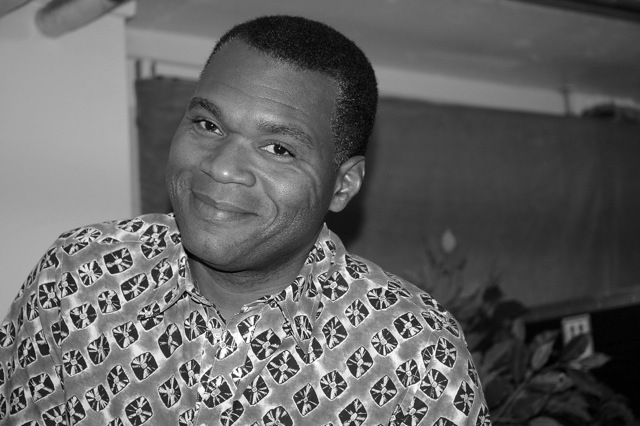
(Photo courtesy by Robert Cray's Archive)
There is nothing more refreshing than talking to somebody that has seen and lived the last 4 decades of music on his own skin. It is almost like an art lesson, in many ways. Robert Cray has recorded many great songs in his career, played with the elite of the music establishment and still going.
His new live album, 4 Nights of 40 Years offers an accurate retrospective on the past and present of the Robert Cray Band and finds this incredible artist from Columbus, Georgia in a real great shape. Bluebird Reviews is thrilled to meet Cray and talk about the new album and music in its globality.
BBR - Robert, welcome to Bluebird Reviews. The Live Album 4 Nights of 40 Years is the best way to celebrate an important landmark of your career. How easy was it for you to choose the many key songs to put on the album, given your extensive catalogue?
RC - Well, I had help, you know. We had Richard Cousins, our bass player to help out as well, together with our producer Steve Jordan and all our Management Team. We gathered together and we played a lot of tunes, we watched some video footage of some of our concerts and work out which of those were more suitable for the CD/DVD project. It was a great find as well, checking out this old video footage. It gave us a lot of pleasure and fun.
BBR - On the record there is a mini live show recorded in the Netherlands in 1987, featuring Smoking Gun and Still Around, among other tracks. Did you choose that particular show to be featured due to the quality of the live performance?
RC - There were three reasons why that show was chosen. First, the performance, then the line-up and the songs we played. We do not play some of those songs anymore, these days. I thought, choosing that show, was a great way to get these songs included on the record with that particular band which we recorded those tunes with.
BBR - On the DVD there is a touching tribute from you to Richard Cousins, your lifetime friend and band member of the Robert Cray Band. Can you choose three words to describe your friendship?
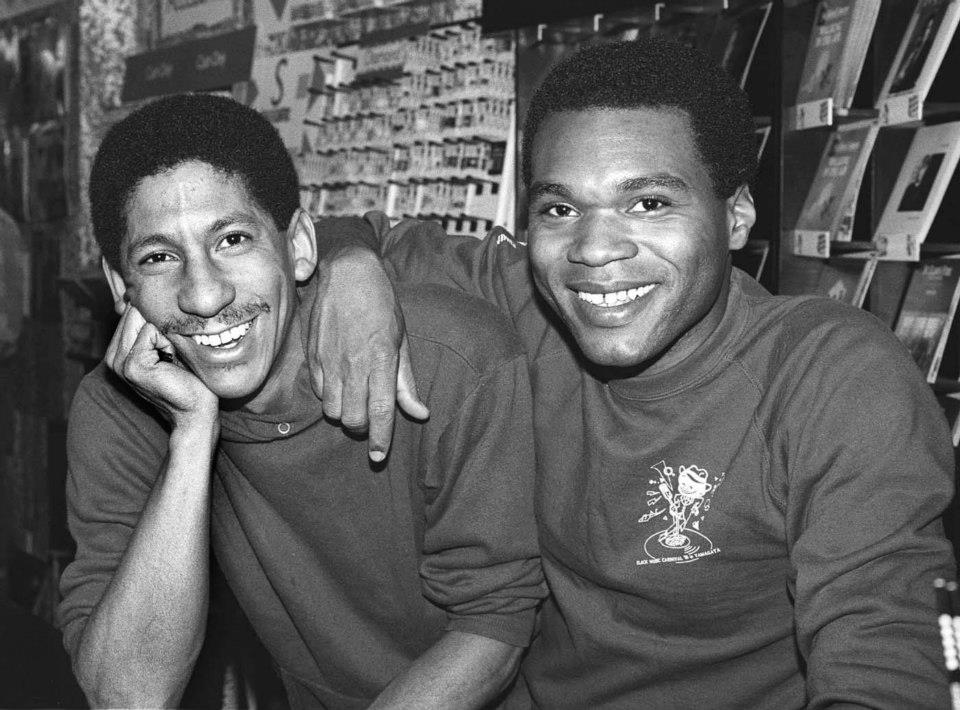 (Photo courtesy by Phil Weedon)
(Photo courtesy by Phil Weedon)
RC - Ha (giggles)! Three words, that is hard! I don't know. He is my best buddy, you know. It's just how it is. We have been friends since we were 15-16 years old. We went to rival High Schools, in the same High School District and we played in bands together long before we started the Robert Cray Band in '74. We grew up picking our cores and decided what it was we wanted to play before starting the band. I guess there is a lot more too. I mean, here I am, the frontman of the band, so to speak, but in the background, I know that there is Richard, which has always been the mouthpiece. Back in the early days, it was Richard that would go out and book the gigs for us, due to the fact that back then, we didn't have any Management or Booking Agency. That is the kind of personality Richard is. He is the outgoing one and I am the introverted one. Richard, back then, would also introduce the tunes when we were playing live, because I could sing the tunes to the audience but I couldn't say a word while on stage! So, it has been a Team thing, a joint effort all along.
BBR - You always have been depicted as one of the best music storytellers in the whole music world. How much has the angry Robert Cray of Nice As A Fool Can Be from the Who's Been Talkin' era, changed and developed his writing style?
RC - Well, I had a lot of help. Great lessons were learned by being able to work with Bruce Bromberg and Dennis Walker in particular. Dennis Walker wrote some of the great songs we did early on and his lyrics were very visual. I am talking about tunes like Who's Been Talkin', Right Next Door, Because Of Me, all those are Dennis Walker's tunes. Myself and Richard were able to help for what concerns the musical aspect of such tunes. It was really very special the way Dennis wrote those songs, it was a great lesson for us, to be able to visualize the stories within the songs.
BBR - Many fellow artists have celebrated your special music birthday on the 4 Nights album, people like Buddy Guy, Eric Clapton and Bonnie Raitt, amongst others. Have you ever had any artist in particular, as a music role model, back when you started in the late 70's?
RC - There was a lot but Albert Collins holds a special place. We had the opportunity to work with Albert Collins, I believe the first time was back in 1976, which was just a couple of years after we started the band. We had the great privilege to be his back-up band while he was touring the West Coast, for about a period of over a year and a half. Standing behind Albert Collins, gave me the opportunity to be a backing musician. As a band, we were already playing some of Albert's tunes, therefore that experience gave me the chance to learn even more about him and his style. Albert was a real father figure to us. Through his experience, we learned how to cut our teeth with the first of our heroes. He was really important for us, on many levels.
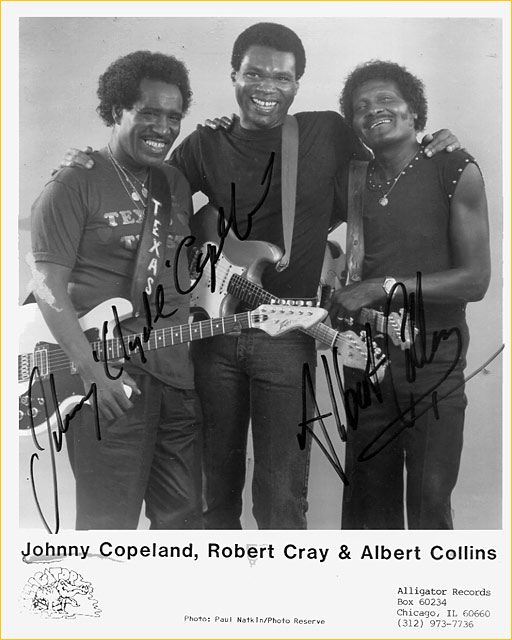 (Photo courtesy by Paul Natkin)
(Photo courtesy by Paul Natkin)
BBR - The Robert Cray Band has changed different band members, since the beginning. I feel the current line-up of the band is one of the best you have ever had. What is the secret about being able to maintain the incredible quality of your sound?
RC - Thank you. You just have to be yourself. I think that is what is all about. The band members have changed, over the years for many different reasons but, fundamentally, I still do what I do. I am upfront and everybody within the band knows what their role is. It is pretty simple. I don't have any strict guideline, you know. I just want everybody to be themselves and let them all play out of their souls.
BBR - You have met and worked with authentic giants of the music business, people like the fellow artists previously mentioned or late great music legends like John Lee Hooker, BB King or Stevie Ray Vaughan. Have you ever thought about writing a book on your life, as a musician? You must have a lot of stories to tell..
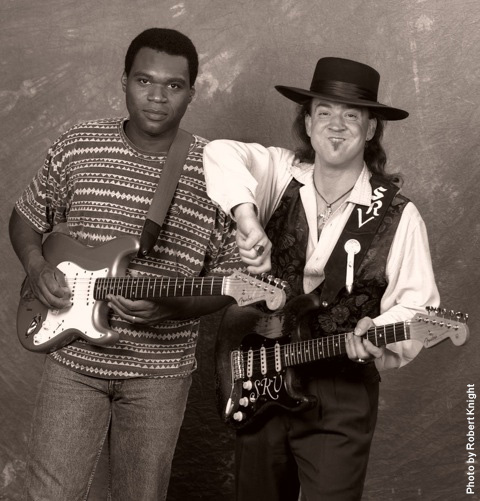
(Photo courtesy by Robert Knight)
RC - There is a lot of stories but probably I need Richard to sit down with me and we can reminisce and put them out into a form that make those stories sound right. Yeah, there has been talk, to be honest and we'll see what happens. You don't know how interested people would be after all, we will see.
BBR - We all know, through your talent and artistry, who Robert Cray was 40 years ago and who you are now, as a musician. When you publish your next live anniversary album, what version of yourself do you wish to be?
RC - Hmm..I honestly don't know, because I am not gonna stop, that's the thing. It is so much fun, you know. When you hit the stage, it's such a challenge. You go out there and it feels like you are walking out there without your clothes on. You have to make people to listen to your music and forget that you are naked out there. Because people are not afraid to say what they feel about a show. And that is the reason why, night after night, we go on stage feeling like it is the first time we play in front of an audience, because that is the way it should be always done.
BBR - Your voice, together with your incredible skills in playing guitar, has always been one of the most recognisable trademarks in your career. Did you always want to become a singer or was that just something that you discovered all of a sudden?
RC - It was something that, you know, I guess goes hand-in-hand actually. I think anybody that plays wants to sing and then you discovered if you can or not. I knew I could hold a melody but, in the first band I was in, we had lead singers. And in a couple of those situations, it just happened that the lead singer quit, so I took over. To be honest with you, the second time that happened, we went to an audition and the lead singer didn't show up for the audition so I took over again. We didn't get the gig but from that moment, I took over the role of lead singer. Being an introverted person, it was a big step for me. When we started the Cray Band, anyway, I was the lead singer but Richard was still making the announcements! (chuckles). It has been a real work in progress, starting talking to the audience on stage between tunes. At first, I started talking to the crowd real fast, because I wanted to be as short as possible and then I gradually slowed down the pace of my announcements in-between songs. As you may know, I am perfectly comfortable, right now.
BBR - Robert, music legacies among artists is what keeps the music chain going, through time. As I am sure many fellow artists have transferred part of their legacies to you, by the same account, what part of yourself, as an artist, would you like to pass to future generations?
RC - I think that people should have an open mind towards music, you know. I think that people should have the opportunity to listen to different music genres. That's how I grew up and the guys in the band grew up and that was long before, especially in the States, people tend to categorise the music a lot. Now you have satellite radios and there are so many different stations playing every single music genre on the planet. So anyone could pick their favourite station and stick to it, they would never change the dial on the radio. In this way, they would be never able to find out about people like Duke Ellington or Hank Williams or Albert Collins. My advice would be to keep an open mind about music. You can try and listen to a tune belonging to a different genre and, if you don't like it, that doesn't necessarily mean you should dislike immediately that genre. Because in the whole world, there is a lot of good country, rock, jazz, blues or classical music. Speaking of my music, whoever comes to our shows, is able to hear many different elements belonging to different music styles and that is the reflection of how we, in the band, grew up. People needs to listen healthily, a little like trying a wide variety of food. When I think about the way I write a tune, it's all natural and spontaneous. It's not like, I sit down thinking of writing a song on a specifing genre. When the tune is finished I would look at it as a unique creation, a genuine result coming from the soul. It's all about thinking freely and be open.
Giovanni "Gio"Pilato
- Details
- Written by: Giovanni "Gio" Pilato
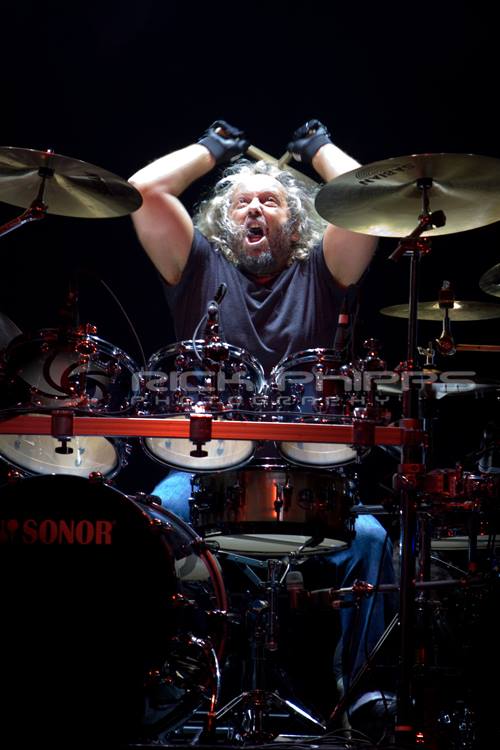 (Photo by Rick Phipps)
(Photo by Rick Phipps)
There are not many better jobs in the world then being a musician. The great thing about being a committed musician is the freedom of expression. That freedom that allows a true artist to express their talent, their instincts and no employer in the world can take that away because it is very personal and pure, therefore uncompromisable.
Tal Bergman belongs, without any shadow of a doubt, to this very special and selected group of artists. Both as a drummer and as a producer, Bergman likes every time to put 110 per cent of himself into his music projects. He is totally devoted and committed to the music cause and its values. His understanding and knowledge of music reaches many different genres, which Bergman manages to combine beautifully with the help of fellow musicians like Joe Bonamassa, Ron DeJesus, Mike Merritt, Renato Neto and Daniel Sadownick. This stellar cast, together with Bergman, forms the Rock Candy Funk Party, an instrumental supergroup now on their second album, called Groove Is King, recently reviewed on our website.
Bergman has kindly accepted to talk to Bluebird Reviews about Groove Is King and his philosophy about music and life in general.
BBR - Tal, welcome to Bluebird Reviews and many congratulations to you and the whole Rock Candy Funk Party for such a stunning record. Considering that you have been intensively live touring in the last 36 months or so, how long did it take to pre-plan the tracks that ended up on Groove Is King?
TB - It took a lot of manoeuvring and we had really short time to make it. The way we approached this record was that we were not going to the studio to record until I had a concept for the whole album in my mind. Once I had the concept clear in my head, then I discussed it with the band, to be sure they were all on board with that and fortunately they all were. Even when I was on the road, I had a little portable studio built in my PC, so every time I was coming up with new ideas, bass lines and interesting grooves, I could keep them with me and work on them. Ron (DeJesus) and Mike (Merritt) did the same, Joe (Bonamassa) had some ideas too and so did Renato (Neto). We had to plan when we had time available, so each of us could get together and cut all the live rhytm sections. I wanted to maintain the same freshness of sound and music essence that we had on our first album (We Want O' Groove). On top of that, whilst each of us brought their own ideas in for the album, we still managed to write new stuff for the record collectively, as we did on our first record, but this time with the understanding I was going to overdub some of the material. All the parts recorded were very well executed and sounding solid and it was a joy to work with my imagination on those perfectly executed parts. Once I finished all the main tracking of the stuff we recorded, I went through the overdubs part, then I sent to Randy Brecker and his wife Ada (Rovatti) the rhythm section tracks and Randy and Ada did the horns arrangements. The process in recording the album took its time, but we made it. I treated the record almost like it was a pop record, with a lot of details on the production side, ensuring that every note was the right one, though still maintaining the feeling and vibes of a live band within the whole production. A lot of work to be done but a lot of fun at the same time.
BBR - The album works so well on many different levels, due to the fact that every single musician, play a vital part in the structure of every track. At which point did you decide to amp up the album's sound by having a horn session recording with you?
TB - That was pre-planned long before we went to the studio. It was something I wanted to do all along, before starting the recording process.
BBR - The modernised cover version of Rock Candy by Brother Jack McDuff is one of the many stand-out tracks on the record and almost an inevitable choice for you, given the band's name. Considering how well the album has been received worldwide in many different charts, including the jazz ones, are you pondering whether, on future albums, we may find more jazz contaminated tunes?
TB - I am sure about it. The reason is that, in my mind, everything that we play, as a band, is always a bit jazzy, because all in all, that is where we came from. Jazz, for me, is such a big word that, every time we get to improvise on a track, we all know we are creating jazz in that moment. I don't take too much notice of how some people may call what we play, when we improvise on a live tune, because myself and the boys know that is fundamentally jazz. Raw sound, no trickeries, it is just us playing and feeling the vibes. We know that, what we are doing in that moment, is the essence of our music belief, as a band and it will always be. That is why we let our musical flow go. And if such flow is good enough for everyone in the band to be recorded on an album, so be it. We all hope that the album is going to sell well. If it does, we are all utterly pleased and not just for economic reasons but also because it demonstrates that people respect what we are, as musicians. Fundamentally, for us, to make an album like this, is a labour of love. The most fascinating part of our band is that we all come from different parts of the world. We all bring in our experiences, background and music knowledge. You cannot have a better definition of being a world music band than what we are and what we try to achieve, in musical terms.
BBR - Now, please, tell us a secret; who had the idea of including Billy Gibbons as a royal MC on Groove Is King?
TB - One day I was sitting with Joe (Bonamassa) and he came up with the idea of having somebody doing some sort of MC intros and segues on the album. I was very keen on the idea and I said: "Let's do it". I then asked Joe who would be his favourite artist playing that role and Joe said: "Well, why we don't call Billy Gibbons?". So I gave him a ring and ask if he could make it and to be in the studio on the following day and he immediately said: "Sure!". I knew some people connected to him and it was a fortunate coincidence he was able to make it to the studio, that day. He was totally supportive of our music and he enjoyed doing the MC part. At first, we thought not to mention Billy on the album notes, because we wanted to surprise our fans. Then we thought: "What the heck, let's reveal it, it might be a further boost to the album". Which I am sure, it proved to be as such. Just between you and I, I didn't ask Billy to do any guitar part because we had already enough guitarists in the band (Bonamassa and DeJesus) and I didn't want to offend anyone! (chuckles)
BBR - Tal, in your splendid career you have been and still are sometimes a producer for other artists and mostly an incredibly talented drummer. When the time comes to combine together those two aspects, as for the case of the Rock Candy Funk Party project, how tricky it becomes to mix the flair and power of improvisation of a musician with the methodical approach of a producer?
TB - It is not easy but I have gotta tell you, for a drummer, it becomes very natural to be a producer too. I am able to have the whole concept of an album in my head, due to the nature of my work as a drummer and, even if I am in the same room with other musicians playing, I am immediately able to tell whether, what we are playing in that moment, is going to the wrong or the right direction. I certainly don't find the two roles conflictual in any way with one another and, as I was saying before, doing what I do as a drummer allows me to be able to spot whether the construction of a tune is going where it should or it is not. I guess that, developing such skills, is part of what I am as a musician and my total commitment to music.
BBR - Has If Six Was Eight been created as an impromptu in the studio, simply by trading licks with Daniel Sadownick or was that something you deliberately wanted to add to the album, as an extra spice to this wonderful music dish that is Groove Is King?
TB - This track is totally live and it was entirely improvised by myself and Daniel, sitting in a room, from beginning to end. There are no overdubs whatsoever on the tune. We had no idea what we were going to do. We just started playing and it just happened. Danny was even playing with his feet, at some point, while we were dueting on the track, which was amazing. I wanted very strongly to have that track on the album because of its rawness and the fact there was no pre-planning at all. I then took my part and Danny's part, separate them and then mix them together into two stereo tracks in my hotel room one night that I was on tour. If you listen very carefully to the tune with an earphone, you will note the stereo effect of myself playing on one side of your earphone and Danny on the other. All the effects you can hear on If Six Was Eight are solely coming from the drumming and the percussions, nothing else. There are all different effects coming in and out that I combined, a bit like a DJ. I wanted to do something that sounds very primitive, from a sonic side but applying such sounds, at the same time, in the modern era by using sound design. Which comes, by the way, by the rhytm itself of what we play. I like the idea of using tecnology to amplify the natural beauty of sounds created by musicians, rather than letting tecnology using me, from a musical prospect.
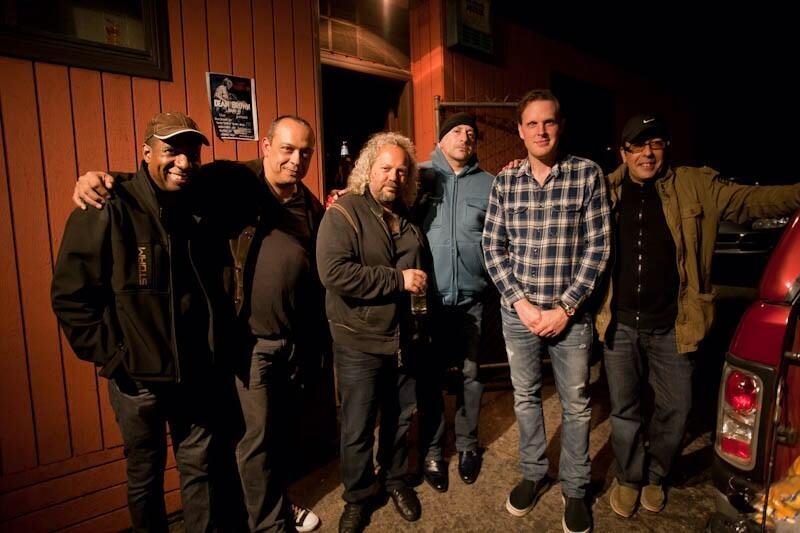
BBR - Of all the possible covers one would expect on a Rock Candy Funk Party album, Peter Gabriel's Digging In The Dirt took me and surely many listeners pleasantly by surprise. Was there any particular reason behind choosing to cover this song?
TB - Joe (Bonamassa) mentioned this song to me some time ago and I remembered that song having a fabulous groove. And it has some nice funky elements too. The problem we had was, how we were going to take a Peter Gabriel's song, with such amazing production and do justice to it in our way? You can imagine that, for an instrumental band, it was quite a task, especially by trying not to be too cheesy. We started from a strong foundation of drums and bass to make it nicely funky. When it came to the point of creating the structure of the melody, with Joe we decided to use an electric guitar and then doubling it with an acoustic one. Ron was great as always in working with Joe on the guitar parts, Renato (Neto) made an excellent job on the keys and Fred (Kron) took great care of the orchestration. To do the vocals, I called my friend Zia in Norway and, in order to create that incredible effect while she is singing, we did with Zia 30 tracks of vocals to create that magic sound on the tune. I gave Zia total freedom on how to arrange it in the way she thought was best. So, those incredible vocals you can hear on the tune, are all due to her phenomenal ability and musical skills. Randy Brecker once again did a magnificent job on horns too. To top this great team effort, Yossi, our producer, made the whole ensemble sound as funky as ever, which was the best result we could hope for.
BBR - The album is a true kaleidoscope that changes faces and colors so many times and constitutes, in my opinion the fun part of the whole album. How much does this album and the band musical concept in general, reflect your personality and your experiences, as a musician?
TB - It reflects a lot of who I am, although I feel that my music range is even wider of what there is already on this album. I can play some hard rock stuff on drums, then next thing I would do is to listen to some Nat King Cole tracks! This record is a collection of music genres that we all like, as a band. None of the stuff we played on Groove Is King would ever be something we didn't want to play in the first place, because this is what we are and what we like playing. In my opinion, the core thing that ties up the whole album, despite having so many different music layers on it, is the groove. We wanted to create strong vibes, strong grooves on this album, something that would make people move. It doesn't matter if we play rock parts or more quiet one, as long as we are able to create that groove that will make people move. Even on The Fabulous Tales track, the groove is the key part. I also arrived to the conclusion that, nowadays, the average amount of attention span that a music listener is putting on a new record is fairly short, if the record does not engage enough the listener. So why not proposing alternatives on just one record, musically speaking, to music fans? In America, I noticed that many radio stations seem to play just one music genre per time. Maybe there is a bit more purism, in the US, when it comes to music in its globality. In Europe and other part of the world, instead, people seem to be more opened to different types of music. Radio stations would play an hour of jazz, next one they would play funk, rock and so on. So, hopefully, we may sound like a very good music station on a sole record!
BBR - The Fabulous Tales Of Two Bands brought a smile on my face; loud, powerful, a totally unexpected fusion of EDM with 70's rock to close the album. Is this a kind of message for the fans, something like "Expect The Unexpected when you buy our records"?
TB - For sure. We love many kinds of music and we are not snubbing any type of music, as long as such genres provide great grooves. We just loved doing this track, moving the tempo from a Prodigy-like kind of style and bringing it to a Zeppelinesque, orchestral sound. We just loved the idea and we said to each other: "Why not?". It was fun doing it and there is that "nasty" element, in the sound, that we loved a lot. Perfect combination for us. It sums up what our record is and our musical philosophy, it is like "You either love it or hate it", no mid-ways. The record is what we are, is a statement of our love for what we do and what we like the most.
BBR - Your fans love you immensely because you give them love back by being always very amicable, loquacious, spontaneous and smiling in every circumstance. Is this the real secret that makes you one of the most loved music artists?
TB - Thank you, I never thought about it. I am what I am. I like to treat everyone with the maximum respect and I love what I do for a living. And I never forget that, if I manage to do what I do, is because of the love people give back to me. I guess it is a two way street kind of concept. I just love to play my music and try to give good vibes to people. If such people love what I do, it is a great feeling for me. In my personal view, by liking what I do, they become already friends of mine, because we empathise on music and surely, based on that root, there is certainly ground to connect on a human level too with each of them. It is too much work for me to wear a mask and pretending to be who I am not. So, as I feel about my music, I guess my personality is a bit like that, I am what I am, take it or leave it.
Giovanni "Gio" Pilato
Groove Is King is available on Mascot Label Group
Rock Candy Funk Party Official Website
